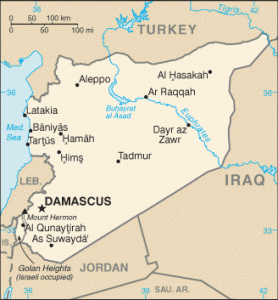Rebel militias in Syria continued fighting Syrian forces in neighborhoods of Damascus on Monday, sending frightened families fleeing the hardest fighting the capital has seen yet.
 The rebels fired grenades at tanks and troops as the Syrian army shelled surrounding areas. In the last few days, the rebels’ attempt to bring the fighting closer to the capital in the hopes of overthrowing the regime of Bashar al-Assad have only worsened conditions for the bulk of Syrian civilians.
The rebels fired grenades at tanks and troops as the Syrian army shelled surrounding areas. In the last few days, the rebels’ attempt to bring the fighting closer to the capital in the hopes of overthrowing the regime of Bashar al-Assad have only worsened conditions for the bulk of Syrian civilians.
The internal stalemate has been matched by the international stalemate. While Syria’s major military ally Russia has partially backed down by stopping all new arms shipments to the regime and agreeing in principle to some kind of democratic referendum on Assad’s rule, the US and its allies continue to aid the rebels.
Washington is actively supporting the rebel militias with arms and resources, despite the fact that they have deep ties to al-Qaeda. The pressure to unseat Assad comes with no concern for the potential boost Sunni extremists will get in his wake.
In a conference last month, UN envoy Kofi Annan brought together world powers and key regional players to agree to strive for a unity government to be formed in Syria according to a democratic process and that it could include members of the present regime as well as opposition.
But such a process couldn’t proceed with the constant foreign meddling.
UN rights chief Navi Pillay last week condemned the continued flow of weapons from foreign powers to both sides in the Syrian conflict. “The ongoing provision of arms to the Syrian government and to its opponents feeds additional violence,” she said in the text of remarks made to the Security Council. “Any further militarization of the conflict must be avoided at all costs.”
Prof. Eva Bellin and Prof. Peter Krause in the Middle East Brief from Brandeis University found in their study of the Syria situation that limited intervention, like arming the opposition, would be counterproductive.
“The distillation of historical experience with civil war and insurgency, along with a sober reckoning of conditions on the ground in Syria, make clear that limited intervention of this sort will not serve the moral impulse that animates it,” they wrote. “To the contrary, it is more likely to amplify the harm that it seeks to eliminate by prolonging a hurting stalemate.”


